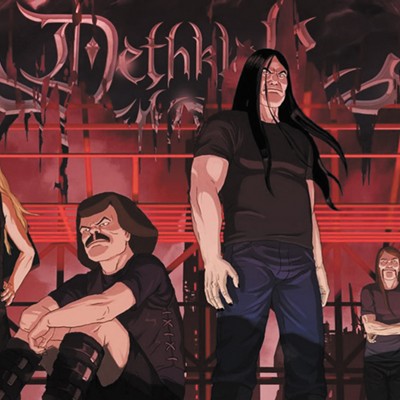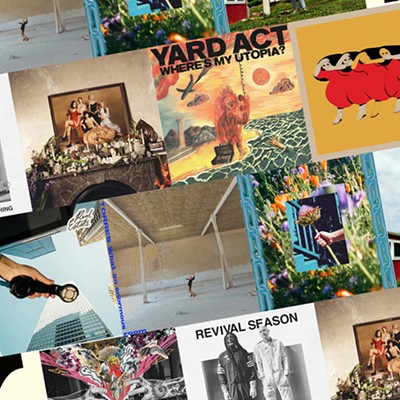What do you do when three titans of classic rock descend upon Spokane simultaneously during the dog days of August to slay boredom and annihilate complacency? What else but declare a Super Rock Week! That’s just what we’ve done. Bob Dylan, Ted Nugent and John Mellencamp will burnish their respective reputations for inspiring showmanship this week (Nugent at the Knitting Factory on Sunday night, and Dylan and Mellencamp at the Greyhound Park on Wednesday).
Yes, the Super Rock Trio’s power is compelling, its entertainment value is unmatched, its influence on rock as an institution overwhelming and unquestioned. Yet much like superheroes on the same team (the X-Men, the Avengers, Super Friends, etc.), Dylan, Nugent and Mellencamp each possess a singular super power that defines him as an individual.
BOB DYLAN
Unquestionably, Bob Dylan’s strength lies within his massive song catalog. In fact, rock’s elder statesman is packing one song that, on its own, managed to completely change the course of popular music in the 20th century — a song imbued with real super power. That song, of course, is “Like a Rolling Stone.”
THE ULTIMATE DYLAN MIX
It’s no easy task selecting just 20 of Dylan’s best tunes. But I thought I’d give it a try. Here, now, are some of my favorites — my Bob Dylan mix, for cassette or ’pod:
“Like A Rolling Stone”
“Queen Jane Approximately”
“It’s All Over Now, Baby Blue”
“Highway 61 Revisited”
“Desolation Row”
“My Back Pages”
“All I Really Want To Do”
“Visions of Johanna”
“Subterranean Homesick Blues”
“Mr. Tambourine Man”
“Tombstone Blues”
“All Along the Watchtower”
“Tangled Up In Blue”
“Chimes of Freedom”
“Temporary Like Achilles”
“From a Buick 6”
“Just Like Tom Thumb’s Blues”
“The Man in Me”
“A Hard Rain’s A-Gonna Fall”
“It Takes a Lot To Laugh, It Takes a Train” “To Cry”
When it first surfaced in the summer of 1965, the song’s sophisticated lyricism, confrontational delivery and six-minute running time initially marked it dead on arrival — unmarketable and unplayable, as far as commercial radio was concerned. It wasn’t until its exposure at a New York City club and the subsequent demand for it by radio DJs that Dylan’s recording label, Columbia, succumbed to popular pressure and released the single in its entirety. Nothing like it had ever been heard on radio before. Dylan’s newly electrified approach had created a new genre: folk rock. Songwriting convention was blown to pieces.
Unlike most radio singles in 1965, “Like a Rolling Stone” wasn’t about love. Instead, it expressed — in plain language — a sneering resentment towards a woman who, once beautiful and privileged, had fallen from grace and lost everything: “Nobody has ever taught you how to live out on the street and now you find out you’re gonna have to get used to it.”
Yet in Dylan’s final verse, she is redeemed by the transformation: “You’re invisible now, you got no secrets to conceal.”
It’s impossible to overstate the influence of “Like a Rolling Stone.” Dylan’s song shattered the radio time-barrier and made poetic lyricism fashionable among serious musicians. It obliterated the status quo, freeing musicians and songwriters to expand the boundaries of rock music. Later that same year (and after being introduced, again by Dylan, to the joys of reefer), the Beatles released Rubber Soul, a folk rock album that marks the genesis of the Fab Four’s evolution from mere pop group to a sophisticated, highly innovative and influential rock powerhouse. The Beatles’ groundbreaking masterpiece, Sgt. Pepper’s Lonely Hearts Club Band, was released less than two years later.
Bob Dylan received a D-plus in a music-appreciation class at the University of Minnesota.
By the end of the decade, nearly all of the British Invasion groups — the Beatles, the Who, the Rolling Stones and the Kinks, among others — were experimenting with long-form compositions and concept albums, something that simply didn’t exist before 1965. Stateside, Dylan’s expansive, freewheeling prose had a similar effect on groups like the Beach Boys, the Byrds and the Jimi Hendrix Experience. Rock would never be the same again.
And the rest is rock history.
TED NUGENT
As an emerging artist from Detroit in the 1960s, guitar-wielding wildcat Ted Nugent would have been exposed to Dylan’s songwriting innovations. Yet he shows very few outward signs of having been directly influenced by them. Brash, ferocious and lacking in subtlety, Nugent has nevertheless carved out a successful and lucrative music career by playing to his strengths — thunderous riffs, blistering guitar leads, catchy song titles — and driving them mercilessly. He’s a genuine rock-guitar stylist wrapped tightly within a larger-than-life persona.
NUGENT'S TEN BEST QUOTES
• "I have busted more hippies' noses than all the narcs in the free world."
• "I am Classic Rock Revisited. I revisit it every waking moment of my life because it has the spirit and the attitude and the fire and the middle finger. I am Rosa Parks with a Gibson guitar."
• "My idea of fast food is a mallard."
• "The war is coming to the streets of America, and if you are not keeping and bearing and practicing with your arms, then you will be helpless and you will be the victim of evil."
• "Vegetarians are cool. All I eat are vegetarians — except for the occasional mountain lion steak."
• "Political correctness is about turning a blind eye to painful reality because your comfortable feelings are more important to you than saving lives and providing quality of life to people who work their ass off to be productive and are a benefit to this great American Dream."
• "I hump the wild to take it all in — there is no bag limit on happiness."
• "War is good when good survives and evil is crushed. If you don't crush evil, then evil will get you."
• "Mankind: A quality-of-life upgrade is available to each and every one of you. It should give you a quality-of-life upgrade, which means no drugs, no alcohol, no fast food — unless, of course, it's a mallard."
• "I still tour like a man possessed, because I am."
In addition to his legendary showmanship, Nugent possesses a secret weapon that is surely the envy of his peers: the key to Spokane.
True fact: In the late 1970s, Nugent, a regular fixture of the regional concert circuit, was awarded the key to our fair city by then-mayor Ron Bair. Sure, he typically performed at the old Coliseum at least twice each year — but the key to Spokane? Even as a teenager with three well-worn Nugent records in my collection, I found the notion of the Motor City Madman given carte blanche to run amok in my hometown a little disconcerting.
And though his days of swinging across the stage by a rope wearing only an animal-skin loincloth are well behind him, Nugent still delivers what his fans have come to expect.
Plan to bring your brains home in a bag after this one.
JOHN MELLENCAMP
While not as culturally significant as Dylan or as viscerally appealing as Ted Nugent, our third member of the Super Rock Trio, Rock and Roll Hall of Famer John Mellencamp, is a formidable entertainment force in his own right, eclipsing both Dylan and Nugent in the arena of radio dominance.
And no one burns brighter in the pantheon of ’80s commercial rock than John “Cougar” Mellencamp, with more than 40 million albums sold worldwide and a tally of 22 Top 40 hits in the United States, all sparked by the success of his 1982 album, American Fool.
Liberal-leaning John Mellencamp took exception to John McCain using his songs during the 2008 presidential campaign and his publicist asked McCain to cut it out. McCain did.
In recent years, Mellencamp has worked very hard to re-establish himself as a serious artist — in the vein of Bruce Springsteen — with a string of albums featuring mature songwriting and a stripped-down, almost acoustic musical approach. He’s also a tireless supporter of progressive causes and is one of the founding members of Farm Aid, an organization that works to raises funds to relieve the plight of small farmers in rural America.
A close listen to his new material is certainly in order, because Mellencamp continues to redefine his songwriting along with the changing times. Most fans will probably be content, though, to bask in the glow of Mellencamp’s ’80s hits — “Jack and Diane,” “Hurts So Good,” “Pink Houses” and “Authority Song,” among others.
In fact, if those attending the Mellencamp show don’t exit with “R-O-C-K in the U-S-A” rattling around inside their brains, I’d be very surprised, indeed.
Bob Dylan and John Mellencamp will tear up Greyhound Park in Post Falls, Idaho, on Wednesday, Sept. 1, at 5:30 pm. Tickets: $55. Call (877) 435-9849. Ted Nugent and Val Halla play the Knitting Factory on Sunday, Aug. 29, at 8 pm. Tickets: $30. Visit http://www.ticketfly.com.
















